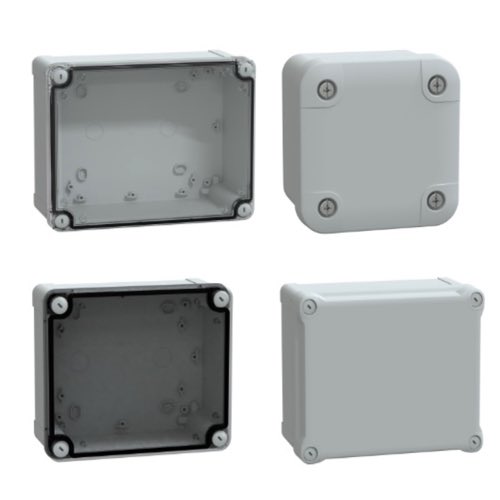Schneider Electric Polycarbonate Enclosures

Schneider Electric polycarbonate enclosures are engineered to deliver outstanding protection for electrical components. They're both strong and clear, providing a top-notch appearance. And you can't ask for better impact resistance than what these enclosures offer since the material used has hardness and impact strength that approaches those of metal.
Schneider Electric polycarbonate enclosures are known for their transparency. It's easy to see what is inside without removing the cover—a big maintenance time–saver. That inspection can be made safely and quickly; there is no need to handle the transparent material any differently than the cover of another type of enclosure. Additionally, the clear polycarbonate material of these enclosures allows work to be done while the cover is on.
FAQs
What is the IP rating of a Schneider Electric polycarbonate general purpose enclosure?
The IP rating of a Schneider Electric polycarbonate general-purpose enclosure is IP66. This rating means the enclosures can keep dust out. Also, the "6" in the rating tells you they've been tested to keep out water that's sprayed on the cabinet from all directions.
Non-Metallic Enclosure Types
Characteristics of non-metallic enclosures:
NEMA 4x rating for outdoor use providing chemical resistance and protection from dust, debris, water and rain.
High insulation value, which provides insulation from cold and hot temperatures, but does not dissipate heat from inside the enclosure.
Non-conductive, meaning components cannot be grounded to the enclosure, but it still provides the same security and tamper resistance levels as metallic enclosures when properly locked.
Types of non-metallic enclosures:
Fiberglass
A thermoset polyester material reinforced with glass fibers. It is the most widely used non-metallic material in the industry. It has high impact strength and rigidity (dimensional stability), a superior working temperature range (-31˚F to 300˚F), excellent electrical properties, moisture and chemical resistance, as well as being cost effective.
Polycarbonate
High-performance thermoplastic resin processed by injection molding or sheet extrusion. It has superior impact resistance, good rigidity (dimensional stability), an extended temperature range (-31˚F to 180˚F), excellent electrical properties, fire retention, UV stability and corrosion resistance in some acidic surroundings. It is not suitable for environments with strong alkalis and organic solvents.
ABS or ABS blends
Acrylonitrile Butadiene Styrene is a common thermoplastic polymer processed by injection molding. It has high impact resistance, but less impact resistance in cold weather compared to polycarbonate, excellent electrical properties, superior chemical and moisture resistance, but a narrower temperature range than fiberglass (-40˚F to 248˚F).
Polyester
High-performance unfilled thermal plastic processed by injection molding. It has high impact resistance, but less impact resistance in cold weather than polycarbonate, excellent electrical properties, superior chemical and moisture resistance, but a narrower temperature range than fiberglass (-40˚F to 248˚F).

